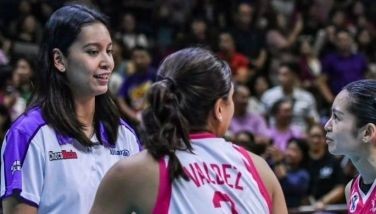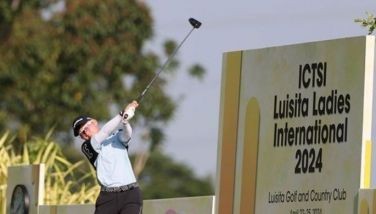Preserving Gilas’ culture
Now that the FIBA Olympic Qualifying Tournament in Manila is over and the Philippines is officially out of contention for a spot in the 12-team Rio competition, it’s time to evaluate what Gilas could’ve done to avoid the heartbreaking experience of failing to win a single game before the home crowd.
Firstly, Gilas should never have been dragged into a situation where it had to defy almost insurmountable odds to book a ticket to Rio. The way to the Olympics was through the FIBA Asia Championships in Changsha last year, not through the qualifier. The Philippines should’ve played a full hand in Changsha, recognizing the odds were more manageable at the regional level. Gilas lost to China in the FIBA Asia final but the lineup didn’t include the likes of 2014 FIBA World Cup veterans L. A. Tenorio, Paul Lee, JuneMar Fajardo, Japeth Aguilar, Jeff Chan and Jimmy Alapag.
At the Manila qualifier, Gilas had to contend with countries not in the Asian zone. The Philippines faced world No. 5 France and world No. 21 New Zealand, losing to both. The support to boost the Gilas lineup with the best possible players should’ve been absolute for Changsha as it was for Manila.
Secondly, for some reason, the Gilas spirit was not as fiery in Manila as it was in Spain or in Changsha. At the World Cup in Spain, Lee was in uniform. There’s something about Lee’s swag that brings out the competitive, if not the fighting, nature of the Filipino player. In Changsha, Calvin Abueva was in uniform. Abueva’s swag also has an infectious influence on the team. In Manila, neither Lee nor Abueva was in the Gilas cast. Lee begged off to recover from knee issues while Abueva was cut from the roster.
An observer mentioned that Gilas’ game seemed too “sanitized” in the do-or-die game against the Tall Blacks. The way the players moved on the court wasn’t the way they performed in Spain or Changsha. The intensity level wasn’t quite the same and the fans noticed it. A PBA coach said the players’ body English sitting on the bench or playing on the court appeared to show a lack of fire or confidence. What was the problem? Was it a chemistry issue? Was it a failure to communicate? Were the players clear on their roles?
No doubt, the Gilas culture must be preserved for future competitions. The Filipino brand of play is unique in the world and has no parallel. In Spain, opposing coaches had difficulty figuring out Gilas’ “abilidad” because the Filipinos played unorthodox basketball, employing crazy combinations and using out-of-the-box tactics. They played with an unusual kind of cockiness that no one would’ve expected from a team with a height-deficient lineup. That’s how Gilas nearly bowled over Croatia in overtime. Curiously, Croatia made it to Rio out of the qualifying tournament in Italy. That’s also how Gilas almost upset Puerto Rico and Argentina. If Gilas ever hopes to return to the Olympics, it will need to play with that Filipino brand of play once again. That culture should never be compromised.
Thirdly, Gilas should prepare much longer for a major international tournament. The nine-day camp in Greece was just too short. It wasn’t enough for Gilas to get ready for the qualifier with two games in a pocket tournament, two virtual scrimmages with Iran and two friendlies with Turkey. Other countries are fine with short training periods because their players live for the national team. In the Philippine case, the players don’t live for the national team, they live for the PBA which is their source of livelihood. It’s a reality that every Gilas coach must accept.
FIBA’s new competition system will force Gilas to play the national team on a regular basis throughout the year. It will mean forming the Gilas Cadets pool to avoid repeatedly disrupting the PBA calendar by borrowing players from mother clubs. Over the medium and long term, the system will be beneficial to Gilas particularly for planning and team-rationalization purposes.
And fourthly, in case Manila hosts another event like the qualifier, it should negotiate certain concessions from FIBA as a stager. At the recent Olympic qualifier, the Philippines didn’t get a break in the calendar, playing France and New Zealand back-to-back when a more favorable schedule would’ve been to take a rest in between games. Surely, as host, Manila deserved the prerogative of choosing its own schedule. After all, Manila paid a hefty price to win the bid and made all the arrangements to stage the event.
As it turned out, Gilas had no benefit of scouting New Zealand before playing the Tall Blacks and its inconsequential rest day came after two consecutive games. The only prerogative Manila had was in choosing to play either at 6:30 p.m. or 9 p.m. on a game day. That was no big deal.
Could the Gilas lineup have been improved? Maybe. An argument could be made to include Abueva and Tenorio in the roster but who would’ve been struck out to accommodate them? One thing’s for sure, the players on the squad could’ve done more and better. They weren’t maximized, perhaps because of lack of preparation, lack of training, lack of communication, lack of cohesion and lack of experience.
There are lessons to be learned from the disappointing experience in the qualifier. It’s essential to assess Gilas’ performance – what went wrong, what went right and how the national team can bounce back to restore pride in the Filipino basketball culture.
- Latest
- Trending






























